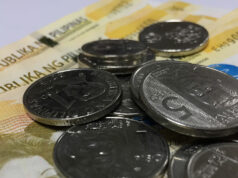Monetary Board 2018 foreign loan approvals up 111% at 7.3B
THE Bangko Sentral ng Pilipinas (BSP)’ Monetary Board approved a total of $7.355 billion worth of public sector loans to fund development projects in 2018, up 111% from a year earlier, the central bank said Tuesday.
“These public sector borrowings will fund projects on transport connectivity (roads, railways, port and airport infrastructure), irrigation and agriculture development, flood management, and the reconstruction and development of Marawi City,” the BSP said in a statement.
The public sector loans included $3.602 billion worth of bonds, $2.853 billion for 12 projects and $900 million for three programs.
According to BSP, out of the total approved public sector loans for 2018, 18% or $1.36 billion will go to five infrastructure projects under the Build, Build, Build Program — the Metro Manila Subway Project Phase 1 ($941.92 million), Chico River Pump Irrigation Project ($62.09 million), New Cebu International Container Port Project ($172.64 million), New Bohol Airport Construction and Sustainable Environment Protection Project Phase 2 ($39.43 million, and the Cavite Industrial Area Flood Risk Management Project ($143.53 million).
“While public sector loans increased year-on-year, the country’s external debt position remains at prudent levels,” the central bank said.
The BSP noted that outstanding foreign debt stood at $80.4 billion at the end of March, an increase of 1.9% from the previous quarter.
“Despite the rise in external debt, the country’s debt service ratio (DSR) has consistently remained at single-digit levels,” the BSP said, noting that DSR stood at 5.1% in the first quarter, well below the international benchmark of 20-25%.
The ratio measures the adequacy of foreign exchange earnings to meet maturing obligations.
Earlier, the BSP said that the increase in borrowing from overseas was mainly due to the national government’s raising of $1.5 billion from global bonds issues with net availments amounting to $1.8 billion to fund general financing requirements and positive audit adjustments, tempered by the increase in residents’ investments in Philippine debt paper including government bonds issued overseas.
According to the BSP, borrowing from the government amounted to $40.2 billion, up 1.26% from the previous quarter, while external debt by the private sector totaled $40.3 billion, up 2.5% from a quarter earlier.
Major creditors were Japan, which accounted for $14.4 billion; the US with $3.7 billion; the Netherlands with $3.7 billion; and the UK with $3.4 billion.
The BSP also said that the external debt ratio as a proportion of gross national income rose to 20% in the first quarter from 19.9% a quarter earlier.
“The ratio indicates the country’s sustained strong position to service foreign borrowings in the medium to long-term,” the BSP said.
Section 20, Article VII of the 1987 Constitution requires that all foreign loans to be contracted or guaranteed by the government obtain prior approval from the Monetary Board.
All foreign borrowing proposals by the national government, government agencies, and government financial institutions should also be submitted for approval-in-principle by the Monetary Board before actual negotiations start, according to Letter of Instruction No. 158 dated Jan. 21, 1974. — Reicelene Joy N. Ignacio



